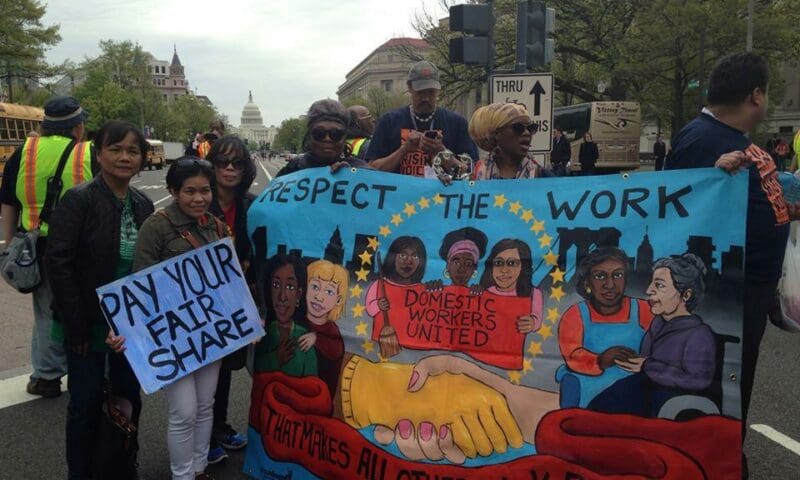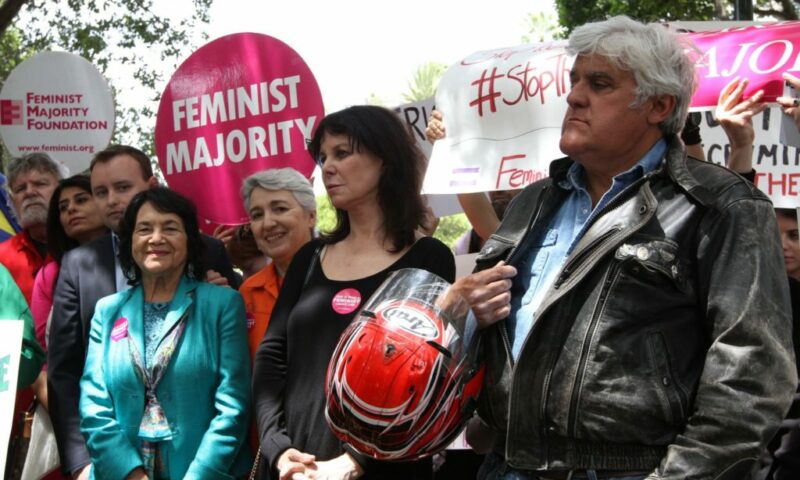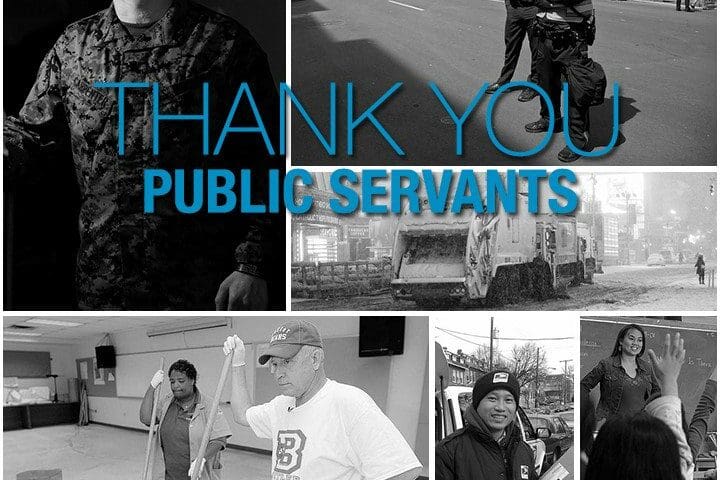

(They drive our trains and buses, teach our children, repair our roads and protect our safety. Public employees perform these and countless other jobs, although they remain mostly off the radar of the public they serve. Our Common Ground series takes us into the lives of these men and women.)
In a large lecture hall in the Biological Sciences Building of Cal State L.A., a student in the introductory anthropology class raised his hand to inquire as to whether or not female chimpanzees demonstrated the same sexual behaviors with each other that males did. “Not that it matters…” he remarked sheepishly. His question elicited giggles across the room while Dr. Jessica Bodoh-Creed shook her head knowledgably, visibly pleased with engagement of her students as she pointed out some key differences in male and female chimp behavior. With captivating energy, Dr. Bodoh-Creed continued her lecture on the behavioral patterns of chimpanzees with anecdotes and media to maintain active listening among her one hundred and forty students.
» Read more about: Dr. Jessica Bodoh-Creed: Adjunct for Now, Academic Forever »


Pity the poor, beleaguered Malibu homeowner. Median income over $135,000 is about two-and-a-half times the County average, and the average home’s value is so far past the County average that the Census Department literally doesn’t count that high. Good for them. But they’re also the NIMBY champs, they don’t like sharing funding with poor schools, and in their free time, folks in the ‘Bu go around erecting illegal signs to cheat you and me out of our right to access the public beach. They have it rough and, as the front page of the L.A. Times explained, Airbnb is making it worse.
Malibu homeowners have some reasonable points: “party houses” that disturb neighbors and probably violate zoning ordinances, and millions of dollars of lost city revenue. At the same time, it’s hard to get too worked up over the poor,
» Read more about: The Enemy of My Enemy Is Still a Jackass »


When you hear about poverty wages and extreme anti-union tactics practiced by the largest company of its kind in the world, it’s natural to think of Walmart. But California-based Taylor Farms is giving the retail giant a run for its money when it comes to low-road labor practices, while offering another example of why it’s time for the U.S. to clamp down on the use of temp agencies by huge companies trying to evade responsibility for unconscionable working conditions.
Taylor Farms is the world’s largest producer of fresh-cut vegetables, and supplies some of the nation’s biggest fast food and grocery chains including McDonald’s, Subway, Pizza Hut, Safeway, Ralphs and Kroger. They operate in nine states as well as Mexico, and earned revenues of $1.8 billion in 2012.
A visit to the company website offers a bucolic image of a multigenerational family-run business with the highest ethical standards.
This afternoon the California State Assembly passed Assembly Bill 1897, which would hold companies accountable for violations of workers’ rights committed by their labor suppliers. The bill, sponsored by Assemblymember Roger Hernandez (D-West Covina), passed 45-20.
Gary Cohn recently wrote about AB 1897 for Capital & Main, noting that passage could have national implications for temporary workers and income inequality. Capital & Main’s Bill Raden and Cohn previously investigated such worker abuses taking place at agribusiness giant Taylor Farms. Labor advocates supported the bill, noting that major corporations have used staffing companies to dodge responsibility for sub-standard working conditions. Meanwhile, more than 50 business groups opposed the bill.
» Read more about: Breaking: Assembly Passes Bill to Hold Companies Accountable for Abuse of Temps »


California wage earners received encouraging news Wednesday when Assembly Bill 2416 (Wage Theft Recovery Act) cleared a major hurdle by passing 44 to 27 on an Assembly floor vote — three votes more than needed to move to the Senate.
The measure, introduced in February by Mark Stone (D-Scotts Valley), is modeled after a successful Wisconsin wage lien law. It is designed to tie off loopholes in California that currently allow unscrupulous businesses to evade paying monetary judgments to thousands of shortchanged, mostly low-wage workers by simply transferring ownership or even by declaring bankruptcy.
According to a 2013 study by the National Employment Law Project and the UCLA Labor Center, of the 18,683 workers who filed claims for unpaid wages with the California Division of Labor Standards Enforcement (DLSE) between 2008 to 2011, only 3,084, or 17 percent, recovered any money at all.
In 60 percent of those rulings,
» Read more about: Proposed Wage Theft Law Passes Major Hurdle »


The release of former Treasury Secretary Tim Geithner’s new book, Stress Test — his self-serving account of the Obama administration’s effort to address the nation’s economic crisis and mortgage meltdown — has triggered a great deal of controversy and debate. Was the Obama economic team too cozy with, or too sympathetic, to Wall Street? Was the stimulus package large enough? Did Geithner, Larry Summers and Ben Bernanke stifle the views of dissidents within the administration — especially Council of Economic Advisors chair Christina Romer and FDIC chair Sheila Bair (perhaps not surprisingly, both women) — who urged bolder approaches?
But on at least one issue, there is a growing consensus: The Obama administration did too little, too late, to help troubled homeowners, who faced plummeting home prices and the risk of foreclosure.
Obama’s closest advisors wrongly assumed that as the economy improved, Americans would be better able to buy homes and pay the mortgage on existing homes.
This week a DVD of The Abbott and Costello Show‘s 1953-54 season was released amid nostalgic fanfare. The old comedy team is mostly remembered today because of its immortal “Who’s on First” baseball routine – an almost Beckettian example of miscommunication that’s been enshrined in Cooperstown’s Hall of Fame. However, the two Jersey boys also enjoy an afterlife in conservative circles through a very similar sketch, “The Loafers Union,” in which straight man Bud Abbott proudly announces to sidekick Lou Costello that he has landed a “loafing” job at a bakery. From this spare description, fans of “Who’s on First” can pretty much guess the kind of linguistic linguine the two former Vaudevillians will make of this double entendre:
Abbott: I got a job at a bakery.
Costello: Good! What’re you doing there?
Abbott: Loafing.
Costello: Loafing?
Abbott: Loafing!
» Read more about: Abbott & Costello’s Vintage Union Bashing »


People who hate government get a lot of aid and comfort from America’s news media, which tend to give big business a party pass when it comes to incompetence and corruption. While any government agency – from Congress to your local school board – is fair game for attacks, business institutions usually come under an investigative spotlight only if the news story has already generated a lot of public heat.
For example, when the government released its report on Shell’s behavior in the Arctic, newspapers put it among the top news stories. Similarly, when the City of Los Angeles brought suits against a couple of the nation’s biggest banks for systematic lending abuses, this made the front section, although not the front page. Likewise, when an oil company paid $5.15 billion to clean up environmental contamination, it was big news.
For the not-so-big stories about corporate screw-ups,


The 1970s are often regarded as a time of false promise (the great broom of Watergate merely clearing the way for Ronald Reagan) or hideous excess (leisure suits, disco, Chrysler LeBarons). Sports writer Dan Epstein sees the Bicentennial decade differently, however. To the author of Big Hair and Plastic Grass, they were nothing less than the end of professional baseball’s innocence. Epstein puts his finger on one year in particular as the turning point for both America’s Pastime and America itself. His new book, Stars and Strikes: Baseball and America in the Bicentennial Summer of ’76, conjures a time and a place where greed, injustice and American piety collided.
Against the backdrop of a newly resurgent New York Yankees team and the juggernaut known as the Big Red Machine, Epstein examines how an increasingly militant baseball players union fought for free agency – a fight that would lead to far-reaching consequences for the game.


Inequality. You’re probably hearing this word everywhere, and rightly so. In the U.S. today, the top one percent own about 38 percent of the financial wealth in America. The bottom 60 percent own 2.3 percent. So what are some of the forces shrinking the middle class?
A new report by the National Employment Law Project (NELP) finds that outsourcing is one of the central factors driving down wages and working conditions in the post-recession economy. The practice allows public and private employers to evade labor laws, avoid payroll taxes, push costs onto workers and shirk their responsibility to provide basic benefits. It also leaves workers in an ambiguous legal status with no clear path to hold their employers accountable for abuses like stolen wages.
The report, “Who’s the Boss: Restoring Accountability for Labor Standards in Outsourced Work,” shows that outsourcing is a shell game for employers trying to avoid accountability,


After more than a month of unsuccessful attempts to reach Lionsgate Entertainment CEO Jon Feltheimer through letters and phone calls, it was time to pay him a visit. Rank-and-file musicians wanted to discuss Lionsgate’s practice of offshoring its musical scoring to distant countries – something that limits local musicians’ ability to earn a living and deprives our communities of tax revenue.
On Tuesday union members and supporters of the American Federation of Musicians’ Listen Up! campaign — including professional musicians, labor allies, faith and community leaders — gathered in Santa Monica’s Stewart Street Park for a rally. The spirited event included AFM Local 47’s executive board and a supportive crowd of musicians representing members from across our union. We were joined in song by our fellow AFM members and Grammy nominees Lisa Haley and the Zydakats. We heard moving speeches from Santa Monica City Councilmember Kevin McKeown and other friends,
» Read more about: Musicians Bring Campaign to Stop Offshore Scoring to Lionsgate »


With the absolute, final-final deadline for 2014 sign-ups now completely passed, and despite numerous speed bumps, implementation of the Affordable Care Act is well under way. From my view as a bedside nurse and advocate for patients and health care workers for more than 30 years, I see a chance to close some dangerous gaps in our country’s health care systems.
In the U.S. we like to think of ourselves as the best at everything. And it’s true that we have the finest health care—for those who can afford it. Unfortunately, for the average American our care is also the most expensive, with some of the poorest outcomes, in the industrialized world. Many Americans, pre-ACA, had no access to anything but emergency care, due to cost and/or pre-existing conditions. These are the biggest gaps ACA seeks to close.
My mother had her hip replaced in 2009. I’m thankful I was there,
» Read more about: An Opportunity to Close Health Care Gaps »


Twice a year Sacramento goes into a frenzy analyzing the state budget. First, in January, the Governor releases his proposed budget, then the “May Revise” appears as the Governor adjusts projections and heeds advice from Senators and Assembly members. The budget, however, is more than a long economic document. It becomes part of the Governor’s legacy, it’s a statement of his priorities, how he will want to be remembered and what he believes will be best for Californians.
Governor Jerry Brown is shaping a legacy based on fiscal responsibility. He wants to be remembered as the Governor who solved the debt crisis and bequeathed fiscal stability to California. Unlike his predecessor, Governor Brown has invested in education, by creating a solvent K-12 system and reinvesting, albeit modestly, in public higher education. However, he is missing some crucial elements that will undermine this success: namely, an investment in low-income families. The Governor forgot that it is working families who most need fiscal solvency.
» Read more about: Working Families Need a Better May Revise »
Sweeping changes underway in the nation’s health care delivery system that expose hundreds of thousands of patients to severe risk of harm are the focus of a major new national campaign by the nation’s largest organization of nurses announced today.
An unchecked proliferation of unproven medical technology and sharp erosion of care standards are rapidly spreading through the health care system, far outside the media spotlight but frighteningly apparent to nurses and patients, says National Nurses United.
In response, NNU has launched a major campaign featuring radio ads from coast to coast, video, social media, legislation, rallies, and a call to the public to act, with a simple theme – “when it matters most, insist on a registered nurse.” The ads were created by North Woods Advertising and produced by Fortaleza Films/Los Angeles. View the new videos and hear the radio ads at www.insistonanRN.org.


Samuel Quintero has a great responsibility. He is the sole source of income for his mother and younger brother, and has to take desperate measures just to provide what Quintero calls “the bare necessities.”
He adds: “I’ve actually had to rent out my bedroom and other rooms in my house just to get by, and I’m applying for food stamps.”
Quintero has been working at McDonald’s for one year and like many of the company’s employees, says his $8 hourly wage just isn’t enough.
“Sometimes I get the check and I literally don’t even see a dollar from it,” Quintero says. “It goes to the bills or the rent. I see everybody that’s working with me. They’re young and they’re like, ‘Well, we went out and did this or did that,’ and I’m like, ‘I have to support my mom and my little brother.’”
Quintero isn’t alone.
» Read more about: L.A. Fast Food Workers: Hold the Harassment, Supersize the Respect »


Filmmaker, union activist, provocateur – David Koff wore these and other appellations with pride and grace during his 74 years, and left behind many friends and colleagues when he died in March. The first three decades of his professional life were spent as a globe-trotting, Oscar-nominated documentarian who chronicled everything from the legacy of colonialism in Africa to Great Britain’s pervasive anti-black discrimination.
He began a second career as a researcher and filmmaker for UNITE HERE Local 11, and it was during that part of his life, following L.A.’s 1992 civil unrest, that Koff and a small band of activists conceived the idea for what became the Los Angeles Alliance for a New Economy (LAANE). A few years later, his obsessive yet meticulous research exposed the corrosive role of the Kajima Corporation in promoting its construction of the woefully mismanaged Belmont Learning Center near downtown L.A. Koff’s leading role in the take-down of Kajima and its white elephant high school-cum-shopping mall is the stuff of legend and set the platinum standard for the investigation of local corporate cronyism.
» Read more about: David Koff: Celebrating a Life Less Ordinary »


Last week a Superior Court judge dismissed a final attempt by community groups to score a victory against the Walmart grocery market that opened in Chinatown last year. The groups’ complaint against Walmart brings up a number of factors that undermine the validity of the Chinatown store’s permits. These include zoning and redevelopment requirements that have not been met, poor record keeping by the City, the lack of current California Environmental Quality Act information about the neighborhood, and the fact that the permits were issued the day before a City Council hearing that could have halted the project.
Walmart has long occupied center stage in the national debate about income inequality because of its low wage jobs and ruthless ability to undercut small local businesses. How, then, did the retail giant plant a 33,000-square-foot flag in the middle of Los Angeles’ urban core, despite long-established safeguards designed to protect the unique neighborhood character of places like Chinatown?


You can find us through Craigslist or fliers at the Laundromat. We live in your homes and prepare your meals. You leave beloved family members in our care. We come from around the globe, often leaving our children behind. But we’re invisible to most Americans. Who are we?
According to Ai-Jen Poo, Director of the National Domestic Workers Alliance, there are 100 million domestic workers in countries throughout the world. In the U.S. they’re key to America’s 21st century economy, caring for children, the elderly and the disabled while family members participate in the workforce. Domestic work is rapidly expanding, she explains, and doesn’t have to represent a road to permanent poverty for its mostly-female workforce.
With 44 local affiliated groups in 26 cities, the Alliance has sponsored legislation throughout the nation to adopt the Domestic Workers Bill of Rights, providing for paid leave,
» Read more about: Domestic Workers: Caring for the American Future »


About 80 activists representing feminists, gays and lesbians, workers and Hollywood celebrities rallied in front of the iconic Beverly Hills Hotel Monday afternoon to protest the Sultan of Brunei’s introduction of a brutal version of Sharia law.
Hassanal Bolkiah, who is worth an estimated $20 billion and has been the ruler of Brunei for the last half century, owns the hotel along with the Hotel Bel-Air and other luxury properties around the globe.
The new law technically went into effect last week and will be fully phased in by 2015. It allows for the public flogging of women who have abortions, the stoning to death of gay men and lesbians, and the jailing of women who become pregnant outside of marriage. Thieves could have their right hands and left feet amputated.
Monday’s protest took place in Will Rogers Memorial Park, across Sunset Boulevard from the Beverly Hills Hotel. It was organized by the Feminist Majority Foundation (FMF) and featured former late-night talk show host Jay Leno;


Public servants play important roles in nearly everything we do, but very often they go unnoticed. From food inspectors who keep our food safe to the sanitation workers who keep our neighborhoods clean, we depend on public servants to perform an array of services that make our lives better.
Monday kicked off the first day of Public Service Recognition Week, and we are asking that everyone take a moment to reflect on the importance of these unsung heroes and say thank you.
One easy way you can do that is to download our “Thank You Public Servants” graphic and share it on social media.
You can already find it posted on our Facebook page, and throughout the remainder of the week, we will be using our page to share inspirational stories of public servants who dedicate their lives to improving our communities and our country.